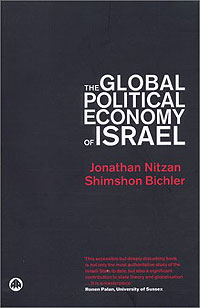| Book Review Archive 29.12.02 [63] |
|
||||
|
by Jonathan Nitzan and Shimshon Bichler
 Never before have these questions been answered as they are in this
highly original book. In order to understand capitalist development,
argue Bichler and Nitzan, we need to break the artificial separation
between "economics" and "politics," and think of accumulation itself
as "capitalization of power". Applying this concept to Israel, and
drawing on seemingly unrelated phenomena, the authors reveal the big
picture that never makes it to the news.
Diverse processes - such as
global accumulation cycles, regional conflicts and energy crises,
ruling class formation and dominant ideology, militarism and
dependency, inflation and recession, the politics of high-technology
and the transnationalisation of ownership - are all woven into a
single story.
The result is a fascinating account of one of the
world's most volatile regions, and a new way of understanding the
global political economy.
About the Author(s)
Shimshon Bichler teaches political economy at colleges and
universities in Israel.
Jonathan Nitzan teaches political economy at York University in Toronto.
Table of Contents
1. Introduction
Never before have these questions been answered as they are in this
highly original book. In order to understand capitalist development,
argue Bichler and Nitzan, we need to break the artificial separation
between "economics" and "politics," and think of accumulation itself
as "capitalization of power". Applying this concept to Israel, and
drawing on seemingly unrelated phenomena, the authors reveal the big
picture that never makes it to the news.
Diverse processes - such as
global accumulation cycles, regional conflicts and energy crises,
ruling class formation and dominant ideology, militarism and
dependency, inflation and recession, the politics of high-technology
and the transnationalisation of ownership - are all woven into a
single story.
The result is a fascinating account of one of the
world's most volatile regions, and a new way of understanding the
global political economy.
About the Author(s)
Shimshon Bichler teaches political economy at colleges and
universities in Israel.
Jonathan Nitzan teaches political economy at York University in Toronto.
Table of Contents
1. Introduction2. Capital and Power: Breaking the Dualism of 'Economics' and 'Politics' 3. The History of Israel's Power Structure 4. The Making of Stagflation 5. The Weapondollar-Petrodollar Coalition 6. From Foreign Investors to Transnational Ownership References Index Reviews:
- Globes "An arresting and creative book. Moving beyond standard explanations, the authors reveal the underpinnings of Israeli's history and politics, and in doing so provide a new framework to examine other such societies in global politics." - Jeffrey Harrod, Professor of International Political Economy, University of Amsterdam "I devoured it in few days. It is a great, impressive and illuminating book, as well as a fascinating read. The enemies of Bichler and Nitzan, but also their admirers, will now be a thousand-fold." - Aryeh Kofsky, Professor of Comparative Religion, Haifa University "I read the hundreds of pages of this book like a thriller... There is a great deal of anger in this book and a great deal of humor. Reading economic literature is usually very boring. This book is fascinating. Marxists and socialists of all kinds, if they don't want to give answers from the day before yesterday to yesterday's questions, should definitely read it." - Itzhak Laor, Professor of Literature, Tel Aviv University "Bichler and Nitzan are without doubt two of the more innovative political economists in the world right now. Relying primarily on data gathered by themselves, with brutal precision and unwavering logic they dispense with the thick layer of ideologies and mystification to lay bare the innermost structures of power of Israeli society. This accessible but deeply disturbing book is not only the most authoritative study of the Israeli State to date, but also a significant contribution to state theory and globalisation. I would place it on par with Poulantzas' work in the seventies. It is a masterpiece." - Ronen Palan, Professor of International Political Economy, University of Sussex "This innovative and thoroughly researched examination of Israel in the global political economy is a brilliant addition to the growing 'new political economy' literature. The volume is distinguished by its engaging style. Theories are laid out clearly and evaluated empirically with reference to a rich descriptive and quantitative data base that includes economic and political variables. Indeed, among the greatest strengths of this work is the way that economics and politics are fully integrated throughout; another is how well the authors site Israel's domestic political economy in a larger web of external strategic and economic relationships. I recommend it highly and look forward to sharing it with my students." - Mary Ann Tetreault, Professor of International Political Economy, Trinity University "Professional academics will, of course, hate it. They will say it is not 'science' and they will say it is not scholarship, it will be called 'journalism' and all that. But you guys knew of course what you were doing. And I am glad you did it this way, because I would have never even opened the book if it were classical scholarship. Life is too short. I found it a good read, a very good read, illuminating, very funny at times, and even when I did not agree (because my views on life, social justice, political organization, are very different than yours), I found it challenging and engaging. I also loved, just loved, all the gossipy snippets. A 'Must' read for anyone interested in the debate about globalization and its discontents, this book pricks and deflates all hot air balloons in sight." - Joseph H.H. Weiler, Jean Monnet Professor of Law, NYU School of Law
|
|||
| BLUE is looking for short fiction, extracts of novels, poetry, lyrics, polemics, opinions, eyewitness accounts, reportage, features, information and arts in any form relating to eco cultural- social- spiritual issues, events and activites (creative and political). Send to Newsdesk. |
